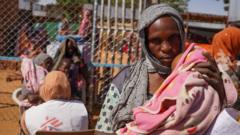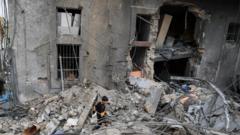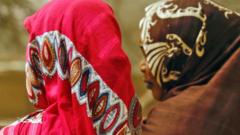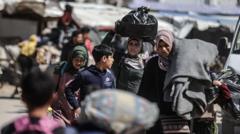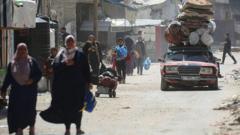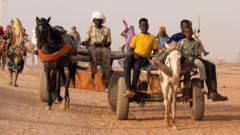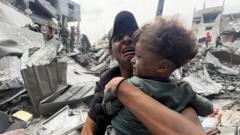This report highlights the personal stories of Hafiza, Mostafa, and Manahel, who share their experiences of life under siege in El-Fasher, Sudan. As conflict rages and humanitarian conditions worsen, they confront loss, fear, and a desperate fight for survival.
Life Under Siege: Voices from El-Fasher in Sudan's Civil War

Life Under Siege: Voices from El-Fasher in Sudan's Civil War
The humanitarian crisis in Sudan's El-Fasher reveals the struggles and resilience of residents amidst fears of violence and starvation.
In a city engulfed by conflict, the stories of its residents echo the harsh realities of life under siege. El-Fasher, in Sudan's Darfur region, has been cut off from the world for over a year amid the ongoing civil war, which began two years ago. With constant bombardment and a humanitarian crisis escalating to alarming levels, many residents like 21-year-old Hafiza, 32-year-old Mostafa, and 26-year-old Manahel are left to grapple with loss, despair, and survival.
Hafiza, who lost her mother in a shelling incident last August, shared her grief and newfound responsibilities that fall on her as she cares for her siblings. Relaying her messages through a phone smuggled into the city by BBC journalists, she narrated how she now bears the weight of family duty after her father's passing prior to the war. Her mother’s death left her devastated, and she recounts her struggles to help displaced neighbors while managing her own heartache.
Mostafa, also utilizing a BBC phone, captured the relentless shelling and violence that endanger the lives of el-Fasher's residents. He described the destruction of his own home, which was damaged and looted, reflecting the lawlessness that has surged amidst the conflict. Despite his situation, he volunteers at a shelter for other displaced people, even as constant threats loom in the background.
Manahel, caught between her family's safety and the war, faced the harrowing choice of leaving her home or staying behind to protect her belongings—an ultimately fatal decision for her father. Now, she assists in community kitchens, providing meals for displaced families living in shelters, yet emphasizes the dire scarcity of basic necessities like food and clean water.
The United Nations has warned of an impending famine in El-Fasher, exacerbated by the fighting, which has turned any semblance of normality into a dangerous gamble for survival. For many like Manahel, the struggles are not just physical but emotional; the memory of lost family members and dashed dreams weighs heavily as they attempt to secure a future in an increasingly hostile environment.
Both Mostafa and Manahel highlight the shared despair stemming from their ethnic backgrounds, which makes them fearful of violence should the city succumb to the control of the Rapid Support Forces (RSF). Previous experiences in other cities like el-Geneina raise alarms about the potential repercussions for non-Arab residents if they are to fall under RSF rule.
Amidst the narratives of personal loss, a stark dichotomy emerges between the realities experienced by those in El-Fasher and the images painted by those in power. Reports from the RSF-controlled areas portray a narrative of restoration and stability, but for the residents facing daily violence and fear, that story feels like a far cry from their lived experiences.
In November 2024, the ongoing conditions forced Hafiza, Mostafa, and Manahel to leave El-Fasher, seeking safety elsewhere. As they reflect on their uncertain futures, questions loom over the fate of those left behind and the possibility of ever returning home amidst a backdrop of continuing war, famine, and fear. The humanitarian crisis in Sudan remains a complex and severe issue, calling for increased global attention and action.



